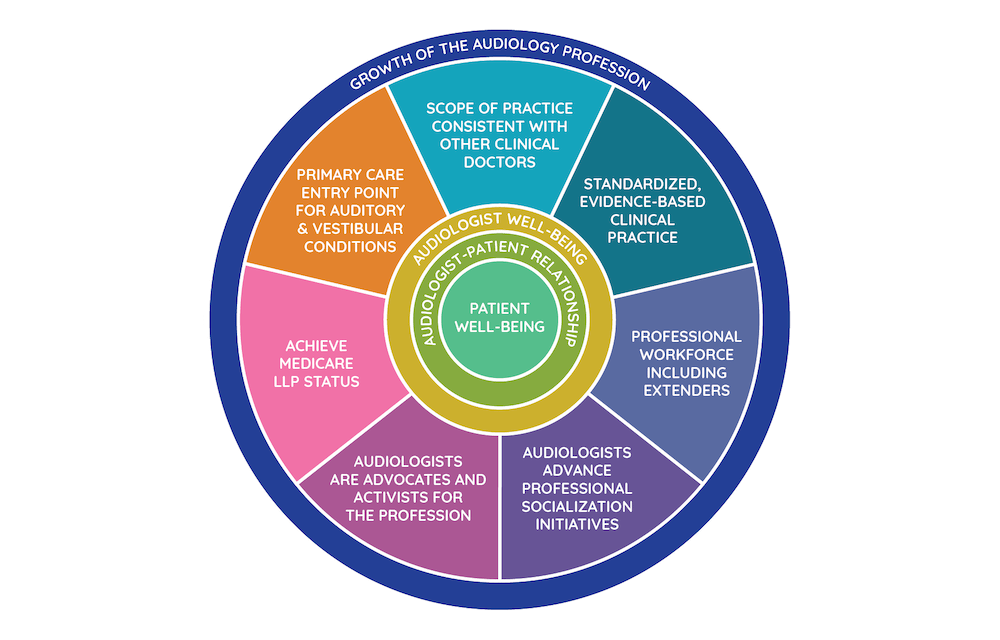Summary: The Academy of Doctors of Audiology (ADA) announced the launch of the Audiology 2050 Initiative during the AuDacity 2024 Conference, which outlines seven key objectives to advance the profession of audiology over the next 25 years.
Takeaways:
- Modernizing Scope of Practice: Audiology 2050 aims to align state audiology laws with the full scope of clinical practice, empowering audiologists to provide comprehensive care for auditory and vestibular conditions.
- Strengthening Clinical Standards: ADA seeks to collaborate on establishing evidence-based guidelines and universal standards of care, promoting the adoption of the ADA Audiology Practice Accreditation.
- Advancing Audiology Workforce: The initiative will develop new staffing models, including qualified extenders, to enhance patient care and practice efficiency, while preparing audiologists for Medicare practitioner status.
During the AuDacity 2024 Conference, the Academy of Doctors of Audiology (ADA) announced the launch of the Audiology 2050 Initiative, which maps out objectives that the ADA believes the profession must achieve in the next 25 years.
What is Audiology 2050?
With patient well-being at its core, the Audiology 2050 roadmap aims to solidify the role of audiologists as primary care providers for auditory and vestibular conditions, advance professional standards, modernize audiology’s scope of practice, and enhance patient care through novel and innovative education, workforce, and care delivery models.
“Over the past 25 years, audiology has transitioned from a master’s-degreed profession to a clinical doctoring profession,” says Jason Leyendecker, AuD, current ADA president. “But the work has only begun. Over the next 25 years, we must achieve the objectives that will fully transform the practice of audiology to obtain all the rights, roles, and responsibilities worthy of clinical doctors.”
Audiology 2050 focuses on seven key objectives necessary to advance the profession of audiology and ensure that it reaches its full potential as a clinical doctoring profession:
- Scope of Practice Consistent with Other Clinical Doctors: The initiative will modernize state audiology laws to reflect the full scope of audiology practice, including evaluation, diagnosis, management, and treatment of auditory and vestibular conditions.
- Standardized, Evidence-Based Clinical Practice: ADA aims to collaborate with other organizations and interdisciplinary experts to establish, promote, and endorse up-to-date, evidence-based standards of care, with a focus on achieving universal clinical guidelines and promotion of the ADA Audiology Practice Accreditation.
- Professional Workforce Including Extenders: By developing and supporting new staffing and educational models, Audiology 2050 seeks to incorporate qualified extenders and optimize audiology service delivery, ultimately improving patient outcomes and practice efficiencies.
- Achieve Medicare LLP Status: Reclassifying audiologists from suppliers to practitioners within the Medicare system will improve beneficiary access and enhance Medicare system efficiencies. Audiologists must prepare for compliance responsibilities that come with this important change.
- Primary Care Entry Point for Auditory & Vestibular Conditions: Audiologists must position themselves as the first point of care for hearing and balance concerns, with increased emphasis on comprehensive, interdisciplinary approaches to patient care.
- Audiologists as Advocates and Activists for the Profession: Audiologists must lead advocacy efforts at the state and national levels to protect consumers and advance the profession.
- Audiologists Advance Professional Socialization Initiatives: Doctors of Audiology must ensure that future Doctors of Audiology are professionally prepared and socialized as clinical doctoring professionals through practical residency, mentoring, and professional training standards that include support for private practice.
The ADA is calling on all audiologists who are passionate about advocacy, education, and innovating clinical audiology practice to volunteer for the Audiology 2050 initiative.
Image courtesy of ADA




